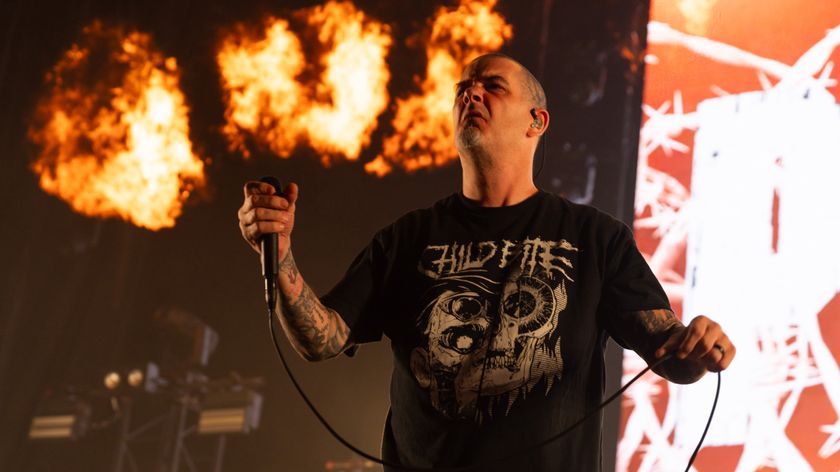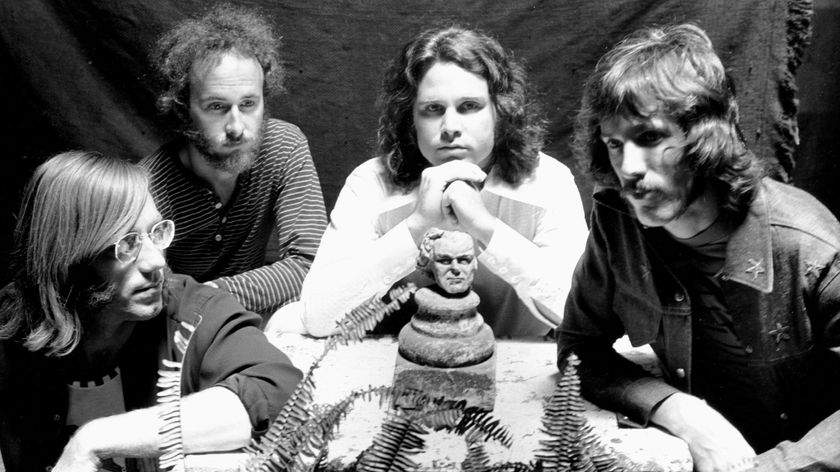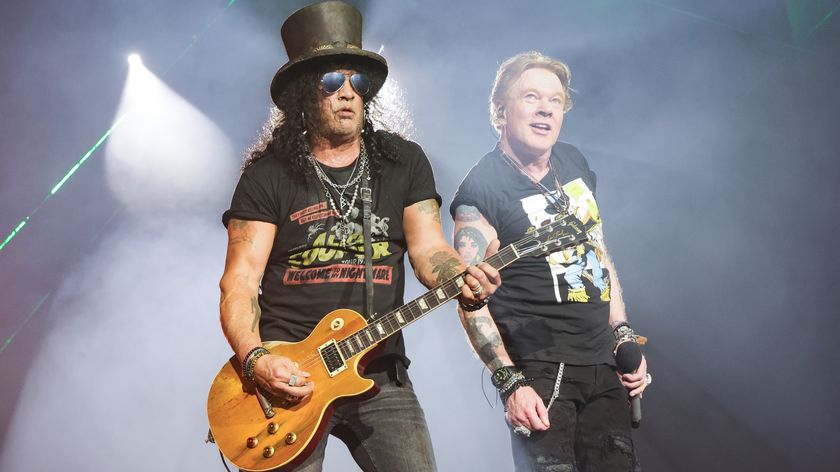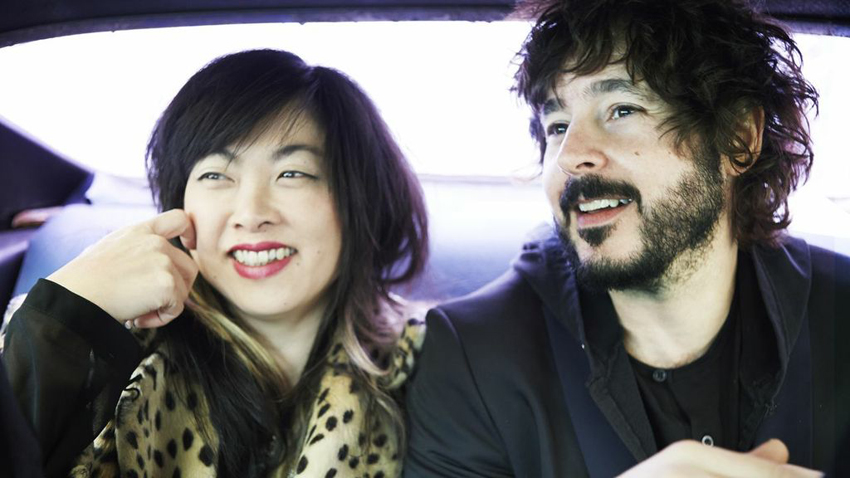
Canadian garage rockers Dearly Beloved aren't your average lo-fi thrashers.
Quite aside from turning five hazy days spent jamming in the desert into epic stoner rock record Hawk vs Pigeon, the hard-touring Canucks have an unlikely link to that greatest of Canadian exports, prog superheroes Rush.
We caught up with frontman and bass player Rob Higgins to talk Hawk vs Pigeon, recording at Rancha Del La Luna and what it was like growing up with Geddy Lee as an uncle...
Hawk Vs Pigeon sounds like it was a crazy project - how did it come together?
"It was literally a situation where we had just put a record out in the United States with Rounder Records called Make It Bleed. The agent that we had in America bailed on the project two weeks before the album came out, so we were left holding our hats wondering, well, now what do we do? It was my birthday coming up, and I decided that for my birthday I would treat myself and the band to five days at Rancha De La luna.
"I'd already been there prior to that and I really liked it. A friend of mine said he knew someone who ran the studio out there, and he hooked me up with Dave Catching who lives in the studio and plays guitar with Eagles Of Death Metal. Dave and I had exchanged some emails, and I'd said that we had some time off and would love to come down and spend just under a week writing and recording. That's really how it all began. We spent five days at the studio, we didn't bring any songs with us 'cos Dave had said that the most success they'd had there as creators was quite literally doing it on the spot. Embracing the environment and going with the flow, so to speak. So that's what we did!
"We spent five days waking up, spending time together, cooking, and the first cool idea I would come up with on the bass guitar, we would pop into the studio and flesh it out, create the dynamics and ultimately the arrangement. By the end of the afternoon the goal was to get one good take of the band playing the basics to the song. We weren't using click tracks or guides, we were trying to get it pretty organic and raw. And because we were down in that space, we wrote some pretty spacey songs. Songs that have a lot of atmospherics and have lower tempos, really take their time building. As a band we really haven't been like that.
Get the MusicRadar Newsletter
Want all the hottest music and gear news, reviews, deals, features and more, direct to your inbox? Sign up here.
"It was pretty much a direct result of being in that environment. After five days of, you know, hanging out in the morning, cooking, drinking coffee, and then in the evenings drinking some tequila and smoking a few joints, after five days of that routine we had a whole bunch of stuff recorded. And then we had to get back to the business of going on tour to support the record we had released in America. That finally started to happen, we got put on the road with Juliette lewis for six weeks. So we kind of had to forget about all the music we had just recorded and go back to touring.
"That went on for about a year, and when we got home we opened up the hard drives to see what was in there, and there was all this stuff. So we started poring through it, added stuff, spent a few months adding some extra vocals and overdubs, and then we had a record. We never had any intentions of going down there and making an eleven songs album. It wasn't the idea, it was just to go down and do something creative and pure with music."
That's the only way something like that could work really - if you said you were going to go somewhere and write eleven songs from scratch you'd have a panic attack!
"I think you would! It would be far too much pressure, suddenly you're creating an expectation for yourself. I think if we had had any expectations aside from taking advantage of the free time, I'm sure it would not have turned out that way. It was almost a matter of momentum.
"Once the first couple of days went so well, we were like 'this is much better than we thought it would be!' We just went with it, and as we found out, that is the experience with most people that work there. Josh Homme from Queens Of The Stone Age books himself three or four days at a time there whenever he's feeling creative. Dave Catching says he holes himself up and lets it flow."
It's obviously a productive way to approach it for the right sort of band.
"It was a lifetime experience that certainly none of us would ever forget. And those guys were all so sweet to us. The guy that lives next door is Patrick Hutchinson, and he is Jack White and Josh Homme's personal sound man, and those guys don't do gigs without Hutch there. And to think someone as successful as that, and around such greatness on a regular basis, would take time to look after us was so humbling. We couldn't believe it!
"He would come over and bring us soup, he would invite us over for coffee, he would take us for drives in the desert to these inspirational places. He went beyond being any sort of host, he was aiding our process, making it better. Here's a guy who works with two incredibly talented musicians."
It's often the way with guys who have had a bit of success, that they want to give it back. It tends to be at the other end of the industry that people get bitter and don't want to help out, it's pretty interesting!
"I know, right? It's such a pleasure when you meet people that successful that still have a grounded take on the day to day life of being in music."
People operating at that level always seem to have got there through a deep understanding of creativity and music, but also by not being an idiot.
"Totally. It's half the battle - don't be an asshole! Step number one, don't be an asshole!"
When you came back to mix the record, was it a struggle to think back to how you'd put it all together?
"It was a bit of a mystery to be honest with you. I didn't even remember some of it, because we were smoking a lot of pot and we were drinking a lot of tequila to be honest with you. So some of the jams we uncovered when we got home I did not remember!
"And I don't mean to sound flaky in that respect, because we have a great respect for the history of rock and roll. We were just trying to go about doing things a little more creatively and trust our instincts. I don't mean to disrespect the history of the business by being so flippant about it. We quite literally enjoy the inspiration of smoking a joint and having a coffee on our break."
Well, it's certainly something plenty of musicians have tried over the years...
"Yeah! It works for us! The side effect is actually sometimes not remembering a jam you may have thrown down during an afternoon. So that was sort of our experience when we opened the hard drive. We had a song called Day Trader, and it was like hearing it for the first time. Like someone used us as puppets to make this song! So it was quite interesting, and it was fun to listen to it and say 'you know this is good, we should consider putting it out.'
It's amazing how far things can go from just trusting your gut.
"We were not working with management at the time that really understood why we would want to do any of these things. They thought it didn't make sense from a business perspective. They wanted us to spend another year writing songs. For us it was a bit of magic that happened. We could get cerebral about it and try and create a product for the world, but we just did something where some magic happened. We didn't want to make it more than it is."
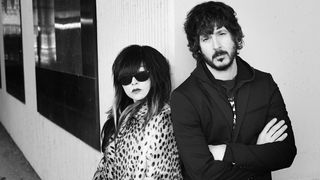
People can be cynical about music - thinking about art as a product can be a dangerous road to travel.
"We just don't want to be part of that. We've all been beaten down by the realities of the business these days. There's not a lot of money in it for everybody any more, so we'd like to think that at least what we're doing is something we enjoy and are proud of. We don't really want to follow the formula that people at record companies have had bands use to write hit songs, unless that's something that we're into.
"If that's what we're passionate about, to create a great pop song, then as long as that's genuinely our trip so be it. But it's not right now. It's not really our thing, so I just want to be honest and be true to where we're out. We're experimenting right now, and we're trying to make something fresh that maybe isn't being made every five blocks."
To shift gears, you've got a family connection with Rush. How did that affect you getting into bands?
"My mom is Geddy's older sister, so he would get stuck babysitting me. So for me, I was lucky! I was sitting in the corner of rehearsals. He'd have to look after me for the afternoon, so if he was going to rehearsal I was going to rehearsal. I would sit in the corner and watch the band for six hours without saying a word. I was always a quiet observer. They maybe thought I was tuned out, but I was absorbing every interaction, evert attempt at a song, every beat, every note. I was so enthralled with all of it.
"Growing up, he was my cool uncle. My mom would take me over there and we would have family visits. He was the uncle who always had the instruments in a sound proof room in the basement. My mom would visit with the family and I would spend the whole afternoon just bashing around on drums and guitars and basses. I can't ever really remember a time not playing music. I think since I was born I've had proximity to it. I guess I've got Geddy to thank for that. I don't think I would have had it otherwise."
To be close someone who has made a success of their career must have been quite inspirational?
"I guess so. I didn't really think about it for a long time in those terms, but the older you get the more you start thinking about it. It's hard to deny now, I'm sure it had a hand in me taking up an interest in it. Clearly here was part of our family enjoying some great success and having a pretty great life for himself. When you're younger it's hard not to be inspired."
At a basic level, sitting in a rehearsal room and watching a band work, seeing songs come together, that's a pretty unique experience for a kid.
"I think so. When I was a teenager I was able to go to London with them, and I was living with them in a house while they were recording an album in England. I was fortunate enough to go on tour with them, live on a tour bus with them and spend time like that. I've always studied how they operate as a band, and it's certainly influenced the bands I've been involved with. They're all about work ethic but maintaining an incredible sense of humour.
"In terms of the music it's always pushed me to push myself. I was afforded some opportunities to see them pushing themselves in the studio. There was one opportunity when I was 12, where I went and stayed with them in Quebec up in the mountains, this little studio called Le Studio just outside of Montreal. It was fascinating to just be in the studio for hours and have nothing to do, just to see their work ethic. Whether laying down a part on a song or figuring out an overdub or working with a producer to get the most out of a piece of music, it was fascinating to be a fly on the wall.
"In particular at that studio, because it was a remote location and an intense session for them. I think the sessions became the album Grace Under Pressure. One of the greatest moments of my entire childhood happened that week actually. Geddy was working on this keyboard overdub for this song called Between The Wheels. He hand't quite nailed it yet, and I'd been sitting there watching him doing it a few times. I had a pretty good handle on what the part was. So when he left the room, I started fooling around with the keyboard a little bit. The producer was like, 'hey, you wanna put one down?' And I was like, 'yeah, sure, let it roll!'
"I did my own overdub of the part, or at least my interpretation of the part. When Geddy came back he said 'hey, shall we pick up where we were and listen to the last take?' But instead of playing him Geddy's take he played him mine! That was the big laugh at dinner that night. You know, novel experiences that certainly were inspiring, but also great personal memories that I'll cherish."
And how about now? Do you share your music with him?
"Probably the greatest gift he ever gave me was the courage to just know that I have to do this myself and find my own path. I don't want to ride on anyone's coat tails. He's always been someone I can reach out to, email any time. He saved my ass on this last tour. We were flying between Edinburgh and Paris and EasyJet lost my bass. It was like 'thanks guys!' It's an hour long flight, how do you lose it? It turned into a five day ordeal, and if it hadn't been for Geddy hanging out with my mom at her house in Toronto right as it was happening, as I was giving mom an update on things.
"It's a funny way the world works, but my step-dad was coming over to Paris for business that next day. Geddy was able to hook my step-dad up with a bass that he could bring over. I have to give Geddy credit, he saved my ass up until just this very year, so he's always given me the ability to find my own path. It's not really something I've really talked about with a lot of people before. It's been great having his support behind the scenes."
What's next for Dearly Beloved?
"We've just finished a new record that we're calling Enduro, that's got this sort of dirt biking theme. We're touring the UK and around continental Europe most of the spring."
For more information visit the official Dearly Beloved website, of connect with the band on Facebook and Twitter.
Dearly Beloved are touring the UK and Europe now.
Most Popular








